This article deals with Noah and his times and discusses the enlightened principle of Grace (Favor).

Soon after ‘the fall,’ we observe man’s attempt to reestablish a relationship with God. God also has a new restoration plan. Seth replaces Abel (Gn. 4.25) and assumes the mantle of righteousness.*. Seth becomes the Keeper of Knowledge, to be later handed down to Enosh.
*Righteousness denotes Abel (Mt. 23.35). Seth: 2nd def. = substitute
Now, the generations are sown with good seed, and the fundamental process of completing the life plan for Earth begins. Following Seth, the ministry tradition is given to us through Enosh, with the Cult of Yahweh becoming the first ministry within the Hebrew Bible. Enoch is the first true prophet, observed by many scholars as the first proto-Christ. A progressive order of events begins appearing, but humanity now faces another challenge.
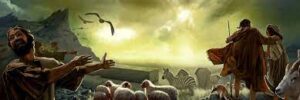 Noah has been given grace (Gn. 6.8) because, even amid giants (6.4) and building corruption, he has maintained the integrity of his family lineage.* He did not mix with pagan societies and beliefs.
Noah has been given grace (Gn. 6.8) because, even amid giants (6.4) and building corruption, he has maintained the integrity of his family lineage.* He did not mix with pagan societies and beliefs.
*”Tamim”=without blemish, pedigree.
In the history of the generations, Noah fulfills the next spiritual step for humanity. Noah performs as a man of faith and faithfully executes his mission. God denotes Noah as one who shall receive grace.
Divine grace is bestowed and holds a special place above all other attributes. Grace means to favor, especially. As we shall see, Noah was a godly man in all respects. For those who practice the Way and sow good seeds, the principle of grace is fundamental.
Chapter six of Genesis relates the degeneration of man, similar to the original fall. Enosh’s initiating work to spread the word of Yahweh and the prophetic mission of Enoch is now being consumed. A raging fire rekindles in the heart of man.
♥
CORRUPTION OF MAN
In the story of Noah, man begins by prospering, “And it came to pass, when men began to multiply on the face of the earth, and daughters were born unto them.” Verse 6.2 then relates the actions of the mysterious sons of God: “That the sons of God* saw the daughters of men that they were fair; and they took them wives of all they chose.” The sons of God illustrated in The Book of Enoch leave us with the vision of ravaging ‘angels’ or ‘Watchers,’ leading to an unholy mixing.
*Sons of God=angels God=ha-Elohim=the Creator
A long slide into spiritual deterioration now works across the lands of Noah, central and southern Turkey, and south into the Palestine region. “Giants in the earth” are mentioned in v. 4. In v. 5, “wickedness” now abounds. The Nephilim are usually associated with angels who descend to Earth (Watchers). “They were evidently great in size, as well as great in wickedness. They were superhuman, abnormal beings; and their destruction was necessary for the preservation of the human race…”*
*The Companion Bible, Kregel Pub., 1990, apex 25.
[The standard explanation for this corruption refers singularly to the physical or human line of Seth, who now begins to marry into the lineage of Cain. Mixed marriages of this kind almost always pull the one down, as the godless corrupt the righteous (Gideon’s Doubt), and thus the sons of God become so embroiled. This dissolution of righteousness can occur within a few generations. The seeds, however, are sure to have been planted generations before. Once in force, the corruption blows like wind through a tattered house. Societal and religious boundaries are rent asunder.

Syncretic marriages produce ‘unequal yoking,’ godly and pagan. This syncretic seed shoves the world into a mixed consciousness. Mixing consciousness sometimes enhances the low but always discolors the high. The spiritual pathway God has planned now becomes twisted. The knowledge and teaching base, the enlightened path to God, will soon become cluttered and conscience-numbed.
Works of evil become insidious, and in part explain why such hard and fast laws were later given to the Jewish people in the Book of Exodus and Leviticus.*
*Also, Deut. 7.3-4, “Neither shall you make marriages with them…(4) For they will turn away thy son from following me (in this case referencing pagans).”
The prohibition of mixed marriages within Judaism (Dt. 7.3-5) first appears in the story of Noah. For our discussion of Noah, the point in v. 2, “…they took them wives of all which they chose,” means that they chose without godly consideration. They decided by sight and seeing “…that they were fair.” Whether viewed as the angelic Watchers, which is the view of this site, or understood as priests who became corrupted, these affairs indicate a general disorder and licentiousness.]
The “men of renown,”* mentioned in v. 4, tell us these have become men of great wickedness and that their wickedness is celebrated, even revered. They may have been worldly-powerful autocrats, city-state officials, or militarists and may have included priests. They may have pursued wealth by the unrighteous use of weights and measures (Cain) and have shunned their godly conscience (accumulation of wealth, greed). They may also have included men who followed after the sciences that the Watchers presented to man. Whether a person accepts the standard interpretation or the Enochian version of these passages, it is clear that many boundaries meant to benefit man have been crossed.
*Men of name, “heroes,” Greek Gods; the remains of primitive truth, corrupted in transmission.
**
This divergence from the pathway and the consequences thereof teach many lessons for those who walk in the Way. The split in consciousness by serving different masters (Mt. 6.24) designates the confusion that will surely result—the mind turns one way and another, unable to reconcile consequences. Most people have experienced this difficulty, even if it is unintended. Even so, the Cult of Yahweh is quickly disappearing throughout the land. Toward a man like Noah, the world would direct jealousy and spite. Jesus later tells us that the reward is great for those persecuted for God’s sake (Mt. 5.12). We find Noah in such a situation.
Toward a man like Noah, the world would direct jealousy and spite. Jesus later tells us that the reward is great for those persecuted for God’s sake (Mt. 5.12). We find Noah in such a situation.
In verse three, the statement, “My spirit shall not always strive with man,” is conclusive. God’s willingness to strive on behalf of man will be reflected according to man’s response to God Himself. For example, if from God we receive, we must also give; we may establish (create), but we must also be responsible. Much like Abel’s sacrifice, God’s children who have received are required to respond to God’s promptings. In Noah’s time, almost everything was subsumed within paganism, and violence prowled the landscape.
The spiritual decay denoted in ch. 6 points to a serious circumstance: “…that he (man) is also flesh,”* indicates that man has reverted into complete immersion and embraced the unconscious state. He is not only pagan but has descended into the sleep of mortality, the sleep of the flesh. The awakening from sleep will later be often mentioned within Jesus’ teaching, as referred to in Matthew 13. 10-17, v. 14 “…shall not perceive.” To continue to awaken to higher levels of understanding and responsibility is determined in many scriptures and is a central theme of Jesus’ teaching of the Way. Upon the land of Noah, there is no remnant of God’s teachings among men.
*If taken as a verb, then, is flesh = “in their erring.” Adam had become like the others.
As man falters again, several attributes become diminished. Internal faith becomes out-pictured, dependent upon what each person receives or can get in the physical world.* The religion proposing contriteness before God, as we see in Abel’s sacrifice, has become lost—a world of grasping, lust, and dishonesty takes hold, where such attributes as faith, love, and wisdom do not prosper. Manipulation and coercion replace wisdom. Lust supersedes the spirituality of both men and women; grasping and covetousness replace any semblance of honesty. Counterfeit earthly standards replace everything that God has given man.
*Cain, named after acquisition or getting; Cain minded.
Mixed consciousness can stand the test of truth for only so long, and then such a mind must fail. Without wisdom, morals, and ethics, man’s machinations will always come undone. The notion of God’s aching heart is first presented: v. 6.6, “…repented of the Lord that he had made man…and it grieved Him at His heart.”* God is shown to feel just as we feel; our feelings originate from God’s nature. Our God is a God of communion, not isolation.** Yet, at this time in history, violence is upon the land, grieving God intensely. In Noah’s time, severe alterations must now be completed.
*Refers to God’s covenant relationship with mankind. **Not Deist but personal.
 The withdrawal of God unto man is now underway. Verse 4, “Giants in the earth” and “mighty men which were of old, men of renown,” these statements refer to men who conquer and ransack. Giants refer to an abnormal size, perceived as equally wicked to their proportion, a perversion of God’s plan for life. The phrase, “and also after that (v.4),” refers to a second irruption located primarily in the land of Canaan, ergo Anakites (Anak) and Raphaim (Rapha), and the rest of the tribes of Canaan were all infected. These tribes were already in the land when Abraham began his journey from Haran. This renewal of perversion would later require the eradication of the Canaanite tribes.*
The withdrawal of God unto man is now underway. Verse 4, “Giants in the earth” and “mighty men which were of old, men of renown,” these statements refer to men who conquer and ransack. Giants refer to an abnormal size, perceived as equally wicked to their proportion, a perversion of God’s plan for life. The phrase, “and also after that (v.4),” refers to a second irruption located primarily in the land of Canaan, ergo Anakites (Anak) and Raphaim (Rapha), and the rest of the tribes of Canaan were all infected. These tribes were already in the land when Abraham began his journey from Haran. This renewal of perversion would later require the eradication of the Canaanite tribes.*
*A good Companion Bible with extended appendices can explain why God required the eradicating of the Canaanite tribes.
The immutability of God never wavers, but His holiness may be affronted. At this time in history, humanity disdains everything godly. Having searched the hearts and minds of all other men and found them unredeemable, God’s favor points toward Noah. He is pure in his heritage, but what good would that do if he were not also a man after God? Noah is now the Righteous Remnant, set aside with bestowed grace.
♥
RIGHTEOUS REMNANT
Noah’s people resided in Mesopotamia and regions north into Anatolia. Biblical historians believe Noah lived in the southern reaches of Turkey and would have lived in a well-wooded area, probably mountainous. According to most scholars, Noah’s roots are ancient Hurrian. Hurrian lands also included the city of Haran, Abraham’s departure point into the land of Canaan.
Gen. 6.8, “But Noah found grace in the eyes of the Lord.” Noah was also deemed a “just man” in v.9, implying sincerity in all his doings. He is willing to live apart from men yet close to God. Accredited within Judaism as the inventor of the plow, Noah removes the Adamic curse upon the ground. We could surmise that Noah takes one small step in faith and wisdom each day. Noah stands like a mountain above the corrupted world, a world he tried to teach and positively influence. He lives his life within the nature of a servant.
What defines Noah as the righteous remnant? A strong foundation in faith establishes Noah. As to the long-term task of building the ark, he remains diligent. Noah is a doer. He serves even as he toils. Noah represents a true luminary in humanity’s enlightenment history. Noah reflects our better man.
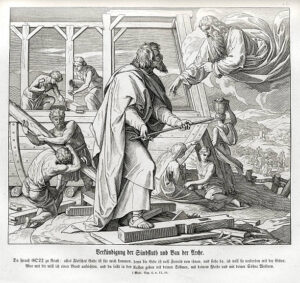
Besides faith and continued faithfulness, Noah possessed knowledge, understanding, and perception far above those around him. With instruction from Methuselah, his grandfather, Noah’s training was probably that of a priest. The knowledge-teaching and the wisdom pathway formed Noah’s person, just as they might in any other individual. Noah also walks this pathway of faith, knowledge, and wisdom daily.
Before Noah, all biblical personages had been building toward a goal. Noah, however, is preparing for the end, and the preparation will be long and arduous. Noah lives by sweat, grit, and labor. For a century-plus twenty years, he toils. Much like us, Noah’s commitments and daily labor define him.
“…perfect in his generation” refers to Noah’s family having untainted heredity. In 7.1, “…for thee, I have seen righteousness before me in this generation.”* God tells Noah that he stands as righteous before Him. Noah is faithful and seeks God; his attitudes and motives are righteous, and Noah forms a unity with God. Amidst life, Noah’s heart is right. He refreshes himself with God every day, and Noah becomes exceptional.
*God’s covenant relation with Noah: Noah’s family lineage is pure; Noah’s spiritual condition is righteous. The seven sacred animals admitted onto the ark are also part of the covenant. The animals are also pure in lineage.
Those who walk in the Way refine themselves and become a thread of this righteous remnant. As we may also do, Noah has positioned himself for Favor.
♥
GRACE ENDOWED
“None are ruined by the justice of God but those that hate to be reformed by the grace of God.”* Most people think of grace as the state of grace, but the active principle of grace means to ‘find favor’ or to be favored: “He found favor in the eyes of the Lord (6.8, RSV).” Grace is Favor. Noah has found favor in God’s eyes, and now favor is bestowed upon him. Facing adverse circumstances, and regardless of temporary outcomes, Noah continues to build the ark. Noah moves in the right direction and persistently does the right thing. With this root of correct thinking and right doing, Noah’s steadfast and faithful stance places him worthy of trust, and grace descends upon him.
*Matthew Henry. Matthew Henry’s Commentary. Vol. 1: 44. six vols. Peabody, MA: Hendrickson, 1991. Print.
Faithfulness or steadfastness allows for the continuation of the soul’s progression. The Spirit moderates from within and, through faith, promotes a natural adjustment to circumstances. The Way teaches that faith in eventual good outcomes is essential. Faith lays the foundation upon which all other attributes function. Like the sower of good seeds, each day Noah reinvests his field. Noah demonstrates a consistent faith that moves into action and, by action, demonstrates and reveals.
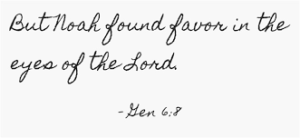 Biblically, grace is found “in the eyes of the Lord.” God sees your pursuit of Him (your fealty) in His eyes and thus bestows. Proverbs 22.1-2, “A good name is rather to be chosen than great riches, and loving favor (from God) rather than silver and gold.” Luke 2.40 refers to Jesus as waxing “…strong in the spirit, filled with wisdom: and the grace of God was upon him.”
Biblically, grace is found “in the eyes of the Lord.” God sees your pursuit of Him (your fealty) in His eyes and thus bestows. Proverbs 22.1-2, “A good name is rather to be chosen than great riches, and loving favor (from God) rather than silver and gold.” Luke 2.40 refers to Jesus as waxing “…strong in the spirit, filled with wisdom: and the grace of God was upon him.”
Noah communed prayerfully to receive God’s grace, God’s protection, and God’s favor. In the depicted story of Noah, we observe grace as bestowed due to the purity of heredity, but it extends to the elements of Noah’s character and his pursuit of God. Verse 6.9 tells us much: “Noah was a just man and perfect in his generations, and Noah walked with God.” This scripture equates Noah with Enoch, as both walked with God*, meaning God was ever-present around them and may also relate to their awakening to the kingdom within.
*walked=walked habitually
Noah’s inheritance of understanding originates from Enoch, even though it was handed down to him by Methuselah. Verse 6.4 in Genesis, referring to laying with the daughters of men, is also discussed in chapter 15.2 of Enoch, as follows: “Wherefore you have forsaken the lofty holy heaven,  which endures forever, and have lain with women; have defiled yourselves with the daughters of men; have taken to yourselves wives; have acted like the sons of the earth, and have begotten an impious offspring (giants?).” Combine this with the understanding entailed in Enoch, chapter 82.9: “And potent the vision of thy dream respecting secret sin of the Earth. Its substance shall sink into the abyss, and a great destruction take place.” The final portrayal in Genesis ch. 6 and the writings within the Book of Enoch are very similar, with Gn. 6 providing a more capsule presentation than reiterating the many vicissitudes in the Book of Enoch.
which endures forever, and have lain with women; have defiled yourselves with the daughters of men; have taken to yourselves wives; have acted like the sons of the earth, and have begotten an impious offspring (giants?).” Combine this with the understanding entailed in Enoch, chapter 82.9: “And potent the vision of thy dream respecting secret sin of the Earth. Its substance shall sink into the abyss, and a great destruction take place.” The final portrayal in Genesis ch. 6 and the writings within the Book of Enoch are very similar, with Gn. 6 providing a more capsule presentation than reiterating the many vicissitudes in the Book of Enoch.
Noah understands that he lives in apocalyptic times, and the hope for man to regain spiritual consciousness seems dim. Rampant paganism has shifted the world to a much lower state of consciousness. Already known to the sons of Yahweh as anathema or polluted, condemned sexual acts and mixing pagan and holy (priestly or angelic) can have only a negative effect. Noah would have been very aware of the disintegration of society. Something far more than just bad behavior or a temporary lapse in the progression of mankind—Noah sees with his eyes, but he interprets what he sees by how he knows God and thus interprets by the Spirit.

In Gen. 6.17, God tells Noah He will bring a flood.
THE WAY
Many scriptures relate to the eternal quality of favor or grace. Psalm 35.27 gives us one version: “Let them shout for joy, and be glad, that favor my righteous cause: yea, let them say continually, Let the Lord be magnified, which hath pleasure in the prosperity of his servant.” Noah lives somewhat in the pleasure of prosperity, whether spiritually or physically. Noah prospers his family and does whatever good work he might do.
In Psalm 35, David calls out to God because his persecution is without cause. Noah finds himself in a similar situation. The world is so corrupt that a good man must defend himself with faith and righteousness, stay close to God (God walked with him), and serve as God directs. Noah remains close to God amid dire circumstances.
The principle of grace is pristine, for it can come only from God. Grace stands beyond the Self and holds out abundance, unending potential, and favor, thus lending itself to eternality. If all comes from God, then all favor must come from God. Embodied within grace are the most basic spiritual and religious principles.
Often we strain at the gnat on the edge of the cup, while letting go allows the kingdom from within to manifest. Allowing the kingdom to come forth is the walk through the field sown with good seed. The Way is a pathway that removes the Self piecemeal to deliver a revelatory message and renewed soul nature. The Way engenders enlightened understanding into the Spirit of God, and birth to the ‘new man’. The conflict between revealed knowledge and doctrine is demonstrated in Jesus’ ministry. Most of Jesus’ problems came from those who followed doctrine but had lost the Spirit of the law. Even within ourselves, intellectual doctrine can supersede revelatory understanding.
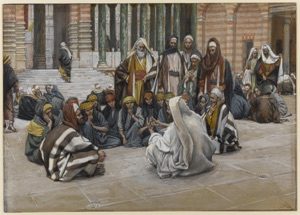
The Spirit flows outward, the king within the kingdom speaks, and finally, we listen. For Christians, the born-again experience initiates acceptance but is also a pathway. It is intended that the new man walks down this path, for the old man cannot.
How does a man walk with wisdom but to sow his pathway before him? Should he not sow, what does he reap, and is he then given over to circumstance? Many Christians unwittingly confuse ‘born-again’ as the ending point. However, its intended effect initiates participation and continued development within the Way.
Jesus teaching near the Temple.
In Jesus’ time, the commoner did not understand that God lived within. The idea of the Spirit animating the soul, including the principle of a kingdom within, remained hidden, a part of the secret teachings. Conscience was understood, but to receive tutoring from Him (from the kingdom within) remained a veil not yet lifted. Therein, the population suffered from a loss of awareness. For most Jews of Jesus’ time, prayer, sacrificing, and crying out, God remained only out-pictured. So, wherein one person seeks an answer or a wisdom message from without, even though this is acceptable, another begins to seek and know Him within.
The pathway Jesus taught always urged others forward, whether by healing, teaching, or example, but always sowing seeds of awakening onto the field of which each individual stood. The New Testament is full of such examples, whether Jesus speaks to the Pharisees, heals, or openly teaches. Noah, for his part, does not place faith in his demonstrations or performance, for Noah has heard from God and then takes that faith and that action forward.* In the teaching of the Way, listening to God’s promptings is one quality of spiritual progression, and Noah seems well attuned to this. For Noah, all of the above attributes lead to action.
*Epistle of James, concerning actions.
One may listen in many ways: quiet time with God, prayer, a state of mind open to Him, inward inspection, quietly considering wisdom, and waiting for His Word with expectation. Communing with God and speaking to God assists each person so that they may receive guidance. Praying openly allows conversance with God, even though His answer may arrive quietly and from within. People determine their spiritual individuality based on how they proceed on the pathway. Each person should closely examine their current path. A righteous pathway requires attention and must remain integral to daily life. It seems clear that Noah and his family pursue such an active pathway and ministry.
♥
What makes man ripe for destruction, and why would that pertain to us or walking in the Way? A key scripture tells us. Verse 6.6: “And it repented the Lord that he had made man on the earth, and it grieved Him at His heart.” He is, ‘I Am That I Am’. From Cain’s seventh-generation son, Lamech, including interfering spirits, or Watchers, and giants born of that unholy interference, such that grievance struck God’s heart.
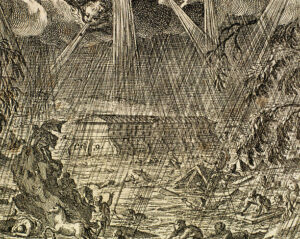
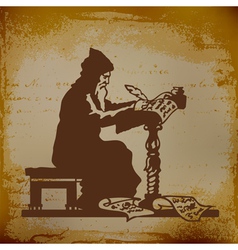
Consider the feelings of the ‘God who is a Spirit’ like you consider your own.
God Bless!
I was just searching for this information for some time. After 6 hours of continuous Googleing, at last I got it in your web site. I wonder what is the lack of Google strategy that do not rank this type of informative sites in top of the list. Normally the top websites are full of garbage.
Hi Papp,
Thank you, will be expanding the Noah article soon. Hang in there.
C. Ray
Hello there! This is my first visit to your blog! We are a group of volunteers and starting a new initiative in a community in the same niche. Your blog provided us beneficial information to work on. You have done a outstanding job!
Hi Raupp,
More coming on Noah…Noahide Law the first iteration of the Way in writing.
“..he interprets what he sees by how he knows God and thus interprets by the Spirit.” Walking in the Way in a nutshell. Love this!
Appreciating the peristence you put into your blog and detaled information you provide.It’s nice too come across a blog ever once in a while that isn’t the same
out of date rehaashed material. Wonderful read! I’ve saved
your site and I’m adding your RSS feeds too my Goggle account.
I will immediately clutcxh your rss fee as I cann not
find yur e-mail subscription hyperlihk or newssletter service.
Do youu have any? Please permit me understand sso that I maay just subscribe.
Thanks.
Hi Damon,
Have opened an ‘X’ account and will be tweeting every few days; will be doing more with the newsletter, both of which you can find on the Homepage. The Newsletter will tend toward be more instructional, but keep it easy-going. Thanks for asking.
C. Ray